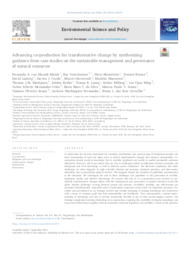Advancing co-production for transformative change by synthesizing guidance from case studies on the sustainable management and governance of natural resources.
Advancing co-production for transformative change by synthesizing guidance from case studies on the sustainable management and governance of natural resources.
Author(s): MATUK, F. A. VAN M.; VERSCHUUREN, B.; MORSELETTO, P.; KRAUSE, T.; LUDWIG, D.; COOKE, S. J.; HAVERROTH, M.; MAEESTERS, M.; MATTIJSSEN, T. J. M.; KEBLER, S.; LANZA, T. R.; MILBERG, E.; MING, L. C.; HERNENDEZ VELEZ, C. A.; SILVA, K. M. T. DA; SOUZA, M. P. V.; SOUZA, V. O.; FERNANDES, J. W.; CARVALHO, B. L. DOS R.
Summary: Co-production has become paramount for scientists, practitioners and social groups of Indigenous peoples and local communities of rural and urban areas to deliver transformative changes that enhance sustainability. Coproduction should result in knowledge that is credible, legitimate and usable to enable sustainable outcomes effectively. However, this is not always the case due to challenges related to differences between scientific and Indigenous and local knowledge, as well as inherent power imbalances. The literature emphasises that these challenges are often triggered by rigid scientific theories and postures, dominant practices, and time-money limitations that co-production projects involve. This happens despite the adoption of guidelines recommended in the literature. We investigate the role of these challenges and guidelines in the generation of credible, legitimate, usable, and effective knowledge. We analyse this role in 13 co-production cases focused on sustainable transformative changes linked with the management and governance of natural resources across the globe. Despite challenges varying between groups and contexts, credibility, usability, and effectiveness are promoted simultaneously, especially when co-production empowers social actors via legitimate processes. Scientists and practitioners do so, through creative and flexible reshaping of existing knowledge and worldviews with a focus on common goals that link sustainability and livelihoods. They conceptualise a mutual understanding of knowledge and that is deemed trustworthy feasible to use in their socioecological context. Our findings complement existing scholarship on co-production, exploring the credibility of situated knowledge and its practical effectiveness together with its commonly addressed legitimacy and usability. A focus on the practices of different actors, including dynamics that are external to co-production, and changes in the scientific and social status quo, are needed to advance co-production effectiveness.
Publication year: 2023
Types of publication: Journal article
Observation
Some of Embrapa's publications are published as ePub files. To read them, use or download one of the following free software options to your computer or mobile device. Android: Google Play Books; IOS: iBooks; Windows and Linux: Calibre.
Access other publications
Access the Agricultural Research Database (BDPA) to consult Embrapa's full library collection and records.
Visit Embrapa Bookstore to purchase books and other publications sold by Embrapa.

